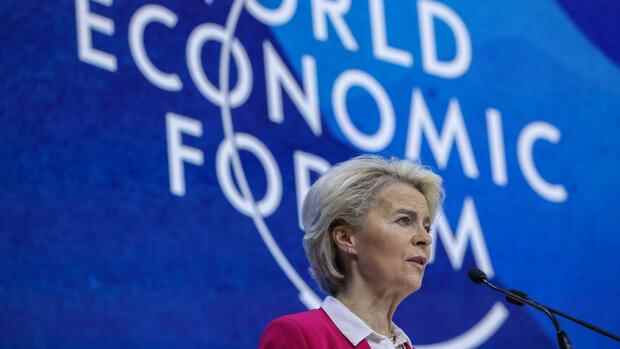Davos, Berlin Ursula von der Leyen found strong words. “Hand in hand we will help Ukraine to rise from the ashes,” said the EU Commission chief on Tuesday at the World Economic Forum in Davos. To support the war-torn country, she announced ten billion euros in financial aid. This is the largest package that has ever been offered to a third country.
At the end of her committed speech in front of the global elite, the German received a lot of applause and a few cheers. Von der Leyen did not avoid the complex problems, but instead tried to provide an EU response to all current challenges.
“This is not just a question of Ukraine’s survival,” the EU leader made clear right from the start. It is not only a question of European security. “Here our entire international order is being called into question. And that is why countering Russian aggression is a task for the entire world community.”
The all-purpose weapon that von der Leyen relies on is more international cooperation to get the problems under control. “We are mobilizing all our economic power,” she said.
Top jobs of the day
Find the best jobs now and
be notified by email.
However, it is precisely this economic power that is in danger of crumbling, at least that is what company representatives are increasingly suggesting. They see the reasons for this not only in the Ukraine war, but also in the division in Brussels.
>> Read also: EU wants to help Ukraine in the short term with a loan of nine billion euros
While the member states from Lisbon to Helsinki passed the first packages of sanctions against Russia at record speed and gave the impression that nothing fit between them, there are now increasing cracks in the European structure, for example with the oil embargo. It is therefore one of von der Leyen’s most important tasks to allow Europe to speak with as unified a voice as possible.
Concerted resistance of the German middle class
And problems for the EU are not only in foreign and security policy. The tense economic situation is worrying the economy. The ambitious ideas for a new self-image of the economy and its obligations towards the state and society are sometimes inconvenient. And for the economy, the crisis is certainly an opportunity to put some unpopular political plans to the test.
German medium-sized companies are now starting to resist unpopular political guidelines in a concerted manner. In a letter that is available to the Handelsblatt, the presidents of the ten largest medium-sized business associations find clear words for the President of the Commission. “Stop additional burdens for medium-sized companies and their credit institutions and give priority to growth and the will to innovate in Germany and Europe!” It says.
In order to stick to the transformation to climate neutrality despite the new challenges, EU policy must concentrate on the essential issues, advise the association presidents. “Therefore, we appeal to you, the political leadership of the European Union: Give businesses and companies in Germany enough time and less bureaucracy to make the necessary adjustments!”
The associations have included a list of twelve EU projects in their letter, which they believe should be put on hold or implemented more easily. The effort for the EU supply chain law makes it difficult for companies to diversify their suppliers. The planned introduction of a CO2 border adjustment mechanism entails unnecessarily complex calculations and documentation for companies. And the planned additional obligations to provide evidence, for example for chemical producers, are extremely tight.
>> Read also: “Mister bureaucracy reduction” – For a new regulation, two old ones have to be deleted
This criticism does not only come up in Germany. According to Luc Frieden, President of the Association of European Chambers of Commerce and Industry (Eurochambres), von der Leyen must “reconcile with the economy”.
However, the speech by the President of the Commission in Davos did not give the impression that the company representatives had the chance to get their concerns across. On the contrary, the war in Ukraine is forcing the EU to accelerate the transformation of the European economy, explained von der Leyen.
Unity in more international trade
The Commission has just presented its “REPowerEU” program. The €300 billion plan aims to accelerate Russia’s phase-out of fossil fuels and transition to green energy sources. Their share of energy consumption is set to increase from 25 percent today to 45 percent in 2030.
Where there is agreement between von der Leyen and business is in the plan to expand international trade relations in order to become more independent. Von der Leyen mentioned important raw materials such as lithium: “Here, too, strong international partnerships are at the heart of the solution.”
And Russia? World Economic Forum founder Klaus Schwab wanted to know whether the country could still return to the European family: “If Russia finds its way back to democracy and the rule of law, it can come back,” said von der Leyen. Russia remains a neighbor of the EU.
More: The war brought Europe together – now the first cracks are appearing
